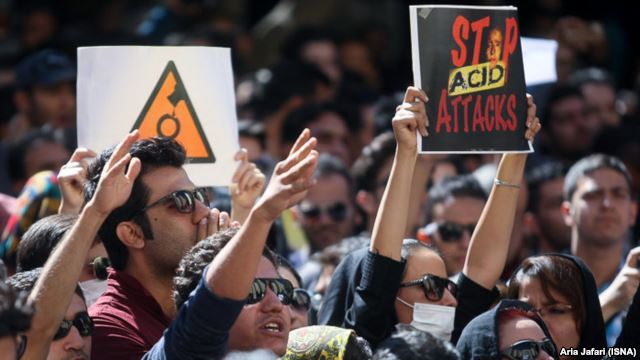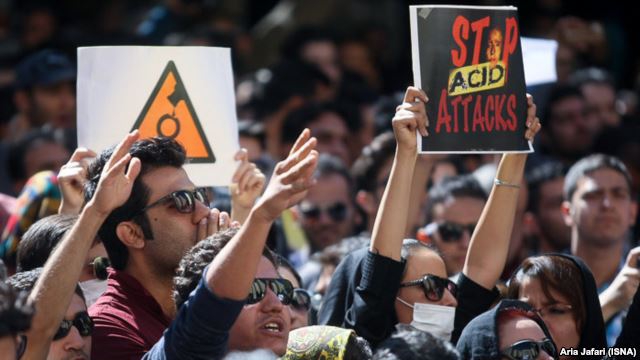 TEHRAN, Iran (AP) -- Iranians rallied on Wednesday in the central city of Isfahan and the capital, Tehran, to protest a string of acid attacks on women in Isfahan in recent months, the latest public outcry over the assaults that have shocked the nation.
TEHRAN, Iran (AP) -- Iranians rallied on Wednesday in the central city of Isfahan and the capital, Tehran, to protest a string of acid attacks on women in Isfahan in recent months, the latest public outcry over the assaults that have shocked the nation.About 2,000 people gathered in front of Isfahan's judiciary building, demanding that the perpetrators be brought to justice, reported the semiofficial Fars news agency. Later Wednesday, dozens of people also gathered in front of the parliament in Tehran to condemn the attacks and demand punishment for those behind such assaults.
Acid attacks are very rare in Iran, but Isfahan has seen a string of eight cases of such assaults over the past few months, police chief Gen. Ismaeil Ahmadi Moghaddam told reporters.
According to police, the attacks all had the same pattern - attackers on a motorbike, one driving, the other throwing acid at women sitting inside a passing car.
Moghaddam said an ongoing police investigation suggests the same attacker threw the acid in all the assaults. Police have already arrested four suspects in the case but the extent or nature of their suspected involvement was not known.
Local media have speculated that the attackers targeted women whom they considered to be immodestly dressed. Iranian women must cover themselves in public and wear a headscarf.
Moghaddam dismissed the speculations, saying claims the women were attacked because they were not sufficiently veiled were "wrong."
"The victims belong to observant (Muslim) families," Moghaddam said, according to the official IRNA news agency.
Gholamhossein Mohseni Ejehei, a spokesman for the Iranian judiciary, reiterated his earlier remarks that the suspects, if convicted, should receive harsh and "most serious punishment" - usually a reference to execution.
Local police commander, Col. Hossein Hosseinzadeh, said the person suspected of throwing the acid was likely a "mentally disturbed" individual. He did not elaborate.
In the past, acid attacks in Iran were usually linked to personal grudges. In 2011, the case of an Iranian woman blinded by a spurned suitor drew international attention.
The victim, Ameneh Bahrami, forgave her attacker in a hospital operating room, just before a doctor was about to carry out a court-ordered retribution and destroy one of his eyes with acid, under the Islamic, or Sharia, practice of "an-eye-for-an-eye."
Iran's judiciary spokesman Gholam Hossein Mohseni Ejehi defended the Islamic practice but stressed that in cases such as the latest string of attacks in Isfahan, "deterrent punishment must be carried out so that no one would dare commit such crimes in the future."
By The Associated Press
The Iran Project is not responsible for the content of quoted articles.











